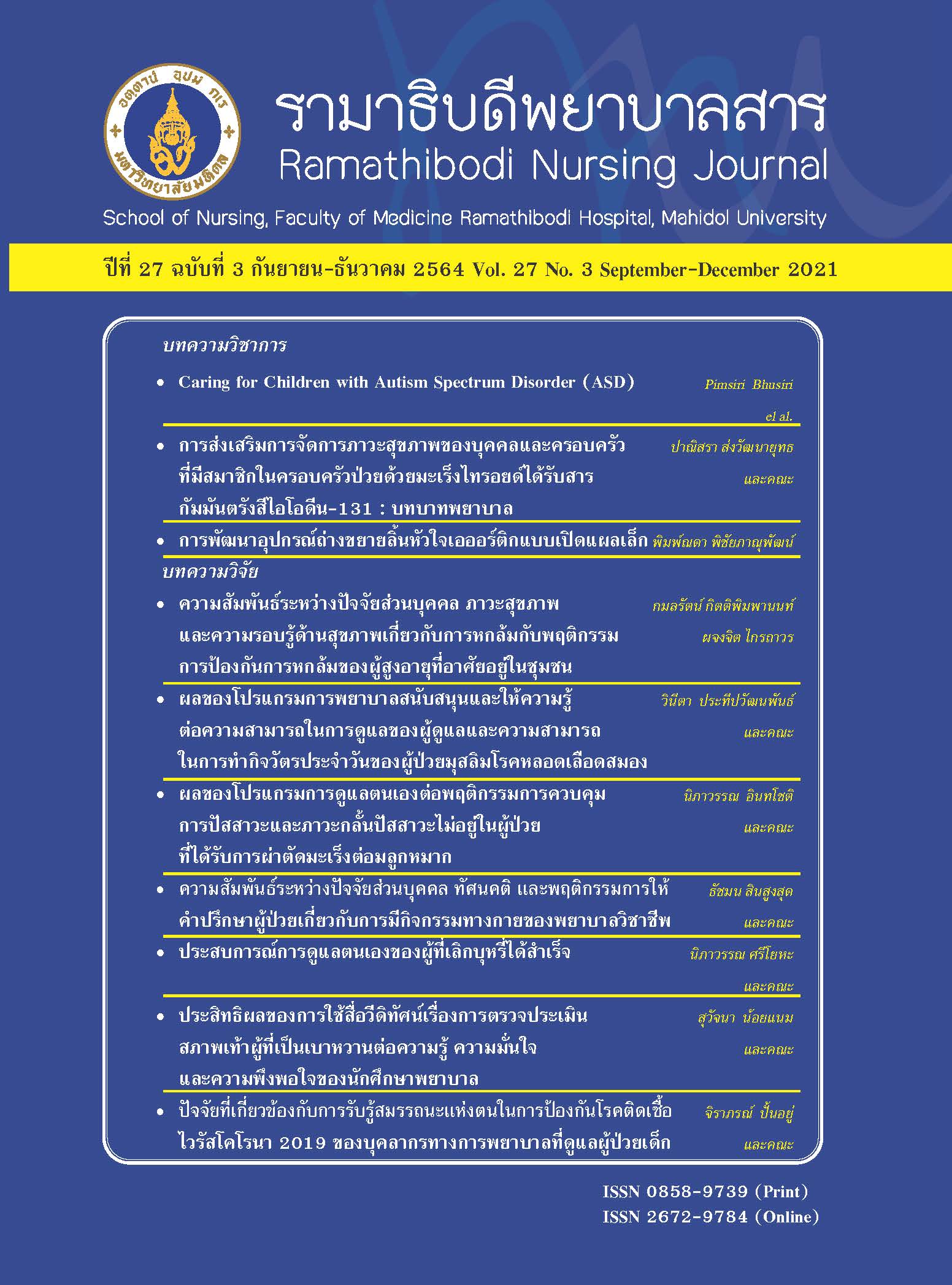ประสบการณ์การดูแลตนเองของผู้ที่เลิกบุหรี่ได้สำเร็จ
Main Article Content
บทคัดย่อ
การวิจัยเชิงคุณภาพครั้งนี้ มีวัตถุประสงค์เพื่ออธิบายความหมายและประสบการณ์การดูแลตนเองของผู้ที่เลิกบุหรี่ได้สำเร็จ โดยใช้ระเบียบวิธีการวิจัยแบบปรากฏการณ์วิทยา ผู้ให้ข้อมูลเป็นผู้ที่เลิกบุหรี่ได้สำเร็จจำนวน 10 รายที่มีความสมัครใจในการเป็นกลุ่มตัวอย่าง ซึ่งได้คัดเลือกผู้ให้ข้อมูลแบบเฉพาะเจาะจงจากคลินิกเลิกบุหรี่ของโรงพยาบาลรัฐบาลจำนวน 1 แห่ง เก็บข้อมูลโดยสัมภาษณ์เชิงลึก การสังเกต และการบันทึกภาคสนามนำข้อมูลการสัมภาษณ์มาถอดข้อมูลแบบคำต่อคำ วิเคราะห์ข้อมูลตามวิธีการของโคไลซี ผลการวิจัยพบว่า การให้ความหมายการดูแลตนเองของผู้ที่เลิกบุหรี่ได้สำเร็จ แบ่งออกเป็น 2 ประเด็นหลัก ดังนี้ 1) ความตั้งใจทำตามเป้าหมายที่ชัดเจน และ 2) การมีจิตใจที่เข้มแข็งในการเอาชนะใจตนเอง ประสบการณ์การดูแลตนเองของผู้ที่เลิกบุหรี่ได้สำเร็จ แบ่งออกเป็น 4 ประเด็นหลัก ดังนี้ 1) การพบเจออุปสรรคในการเลิกบุหรี่ 2) กว่าจะเลิกบุหรี่สำเร็จได้ใช้หลากหลายวิธี 3) ตัวช่วยสำคัญที่ทำให้เลิกบุหรี่ได้ และ 4) ผลลัพธ์ที่ได้ทำให้ไม่อยากกลับไปสูบบุหรี่อีก ผลการศึกษานี้จะช่วยให้เกิดความเข้าใจเกี่ยวกับประสบการณ์การดูแลตนเองของผู้ที่เลิกบุหรี่ได้สำเร็จ เพื่อเป็นแนวทางให้แก่ผู้ที่ต้องการเลิกสูบบุหรี่ เป็นข้อมูลให้แก่พยาบาลและบุคลากรในทีมสหสาขาวิชาชีพในการช่วยเหลือดูแลบุคคลให้เลิกสูบบุหรี่ได้อย่างเประสบความสำเร็จ
คำสำคัญ : ประสบการณ์ การดูแลตนเอง ผู้เลิกบุหรี่สำเร็จ
Article Details
บทความ ข้อมูล เนื้อหา รูปภาพ ฯลฯ ที่ได้รับการตีพิมพ์ในรามาธิบดีพยาบาลสาร ถือเป็นลิขสิทธิ์ของวารสาร หากบุคคลหรือหน่วยงานใดต้องการนำทั้งหมดหรือส่วนหนึ่งส่วนใดไปเผยแพร่หรือเพื่อกระทำการใด ใด จะต้องได้รับอนุญาตเป็นลายลักษณ์อักษรจากรามาธิบดีพยาบาลสารก่อนเท่านั้น
เอกสารอ้างอิง
World Health Organization. WHO global report on trends in prevalence of tobacco smoking 2015. Geneva: WHO Press; 2015.
Tobacco Control Research and Knowledge Management Center. Report of Thailand statistics tobacco consumption.Bangkok: Charoendee Mankong printing; 2018. (in Thai)
Department of Desease Control. Tobacco consumption control’s plan in 2017-2021[Internet]. Bangkok; 2015
[cited 2019 Jul 4]. Available from: http://plan.ddc.moph.go.th/meeting30_1augsep/meetting30_1/Documents/7
(in Thai)
Wanchai A, Wangruangsatid R, Srisaket J, Phrompayak D, Kaewsasri A. Smoking behavior modification patterns
of Thais: a systematic review. Journal of Public Health.2018;48(2):198-08. (in Thai)
Imnamkhao S. Behavioral patterns of smokers at the smoking cessation clinic in Mahasarakham. Journal of
Nursing Division. 2012;39(3):7-20. (in Thai)
Pantaewan P. Self-efficacy theory and smoking cessation.Journal of The Royal Thai Army Nurses. 2017;18(3):35-
(in Thai)
Thagurngsakdakul S. Factors associated with successful smoking cessation among participants in a smoking
cessation program at Nangrong hospital, Buriram province. Medical Journal of Srisaket Surin Buriram
hospitals. 2018;33(3):331-45. (in Thai)
Suthakun S, Lerkiatbundit S. Psychometric properties of scales for psychological variables based on the
transtheoretical model among smokers. Thai Journal of Pharmacy Practice. 2009;1(1):47-63. (in Thai)
Wanichwatphibun D. How to promoting smoking cessation. Thai Journal of Tuberculosis Chest Diseases and
Critical Care. 2018;37(3):75-80. (in Thai)
Paha K, Prechawong S. Attitudes, subjective norms, perceive behavioral, and intention to quit smoking in police officers. Journal of The Police Nurse. 2014;6(1):157-69. (in Thai)
National Health Commission. Pattani health assembly:smoking and a way for local people to challenge. Pattani:Thanapress; 2017. (in Thai)
Intarakumhang Na Rachasima S, Rueangrit P, Wannaprasart W. Guideline for behavioral promotion of decreased and stopped smoking among people in Banbungbaurapet,Tumbon Kwaiyai, Muang District, Nakhonsawan Province. Journal of Nursing and Health Sciences. 2012;6(1):43-51. (in Thai)
Simorakot P. Thai alternative therapy for tobacco cessation.3rd ed. Nonthaburi: Uptoyou Createnew; 2014. (in Thai)
Thato R. Nursing research: concepts to application. 3rd ed.Bangkok: Chulalongkorn Printing; 2018. (in Thai)
Orem DE, Taylor SG, Renpenning KMc. Nursing:concepts of practice. 6th ed. St. Louis: Mosby; 2001.
Wongsri P, Chintapanyakun T. Utilization of Orem’s theory with caring and advice for patients with heart failure.Journal of The Police Nurses. 2018;10(1):209-19. (inThai)
Husserl E. Ideas; general introduction to pure phenomenology.5th ed. London: George allen & Unwin;1969.
Colaizzi PF. Psychological research as the phenomenologist views it. In Valle R. & King M. (Eds.), Existentialphenomenological alternatives for psychology. New York:Oxford University Press; 1978.
Orem DE. Nursing: concepts of practice. 3rd ed. New York:McGraw-Hill; 1985.
Matrakul M, Kalampakorn S, Powwattana A. Factors predicting intention to quit of hand-rolled cigarettes
smokers in Chiangrai province. Thai Journal of Nursing.2012;61(1):10-20. (in Thai)
Prasert P, Prechawong S. Effect of intensive smoking cessation counseling and promoting walking exercise
programe on quit smoking behavior in chronic ill patient.Thai Journal of Nursing. 2016;65(1):39-47. (in Thai)
Ramkhuan C, Khuwatsamrit K and Panpakdee O. Factors related to smoking cessation behavior among patients after coronary artery bypass graft. Thai Journal of Cardio-Thoracic Nursing. 2016;27(2):2-16. (in Thai)
Shaw D, Al’Absi M. Attenuated beta endorphin response to acute stress is associate with smoking relapse. Pharmacol Biochem Behav. 2008;90(3):357-62.
Srisuklorm S, Kalayasiri R. Motivation to change smoking behavior of smoker at the Check-up Clinic, King
Chulalongkorn Memorial Hospital. Chulalongkorn Medical Bulletin. 2019;1(1):61-69. (in Thai)
Rungruanghiranya S. Tobacco treatment for patients who wish to quit. In: Thongpue A, Rungruanghiranya S,
Suntorntham S, editors. Handbook of treatment of tobacco addiction in patients with chronic diseases. 2nd ed.
Bangkok: Sintaveekit Printing; 2018. pp. 32-64. (inThai)
Robertson L, Hoek J, Blank ML, Richards R, Ling P,Popova L. Dual use of electronic nicotine delivery systems
(ENDS) and smoke tobacco: a gualitative analysis. Tob Control. 2019;28(1):13-19.
Karom N, Preechawong S. Predictors of short-termsmoking cessationamong patients with chronic diseases.
Nursing Journal. 2015;42(1):2-11. (in Thai)
Wetter DW, Fiore MC, Gritz ER, Lando HA, Stitzer ML,Hasselblad V and Baker TB. The agency for health care
policy and research smoking cessation clinical practiceguideline: findings and implications for psychologists. Am
Psychol. 1998;53(6):657–669.
House JS. Work stress and social support (Addiso-Wesley series on occupational stress). Boston: Addison–Wesley Educational; 1981.


